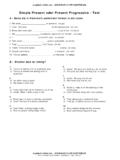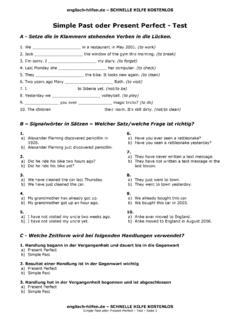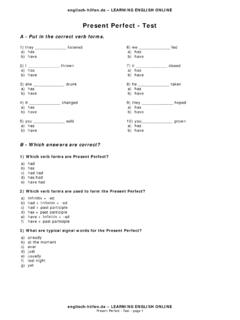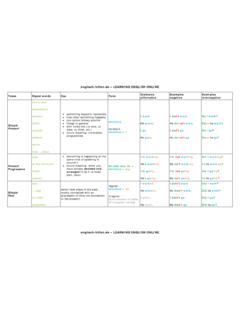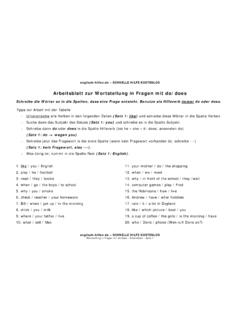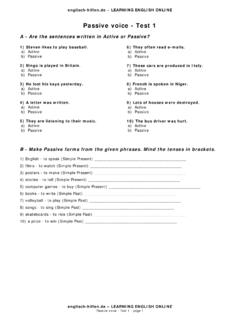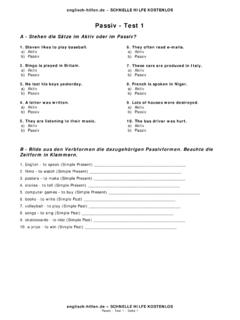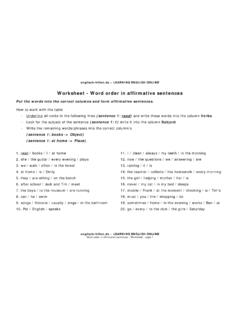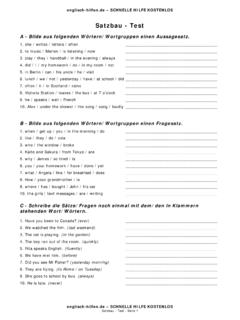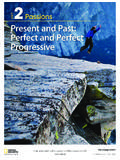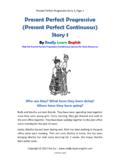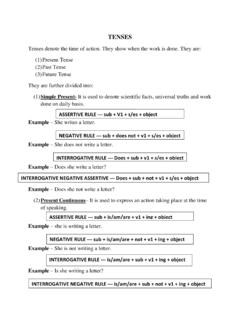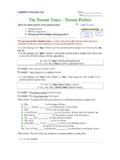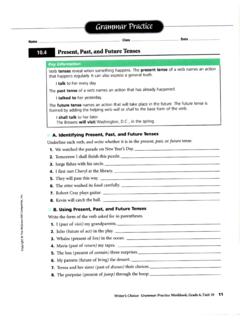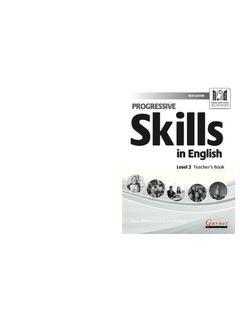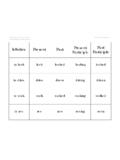Transcription of Englische Zeiten - Test - Englisch-hilfen.de
1 SCHNELLE HILFE KOSTENLOS SCHNELLE HILFE KOSTENLOS Englische Zeiten - Test - Seite 1 Englische Zeiten - Test A - Setze die in Klammern stehenden Verben in die L cke. 1. I sometimes _____ to the cinema. (to go) 2. Yesterday our teacher _____ ill. (to be) 3. It _____ in the West the next night. (not/to rain) 4. Listen! The baby _____ . (to cry) 5. We _____ our bikes soon. (to ride) 6. My father _____ the family car. It still looks dirty. (not/to clean) 7. On Sundays the students _____ early. (not/to get up) 8. _____ Wales? (ever/you/to visit) 9. We _____ the pets now. (to feed) 10. They _____ an essay last month. (to write) B - Welche Antworten sind richtig? 1. Was sind typische Signalw rter f r das Simple present ? a) yesterday b) just c) sometimes d) every day e) at the moment f) often 2.
2 Was sind typische Signalw rter f r das Simple Past? a) yesterday b) ever c) now d) three days ago e) in 1995 f) last month 3. Was sind typische Signalw rter f r das present Perfect? a) just b) already c) yet d) Look! e) usually f) two hours ago 4. Was sind typische Signalw rter f r das present Progressive? a) next week b) Listen! c) never d) at the moment e) yesterday f) now SCHNELLE HILFE KOSTENLOS 5. Welche S tze/Fragen stehen im Simple present ? a) He is from Japan. b) We are not going to feed the pets. c) Anne does not play chess. d) We play soccer every weekend. e) She is listening to an audio book. f) Do they go for a walk? 6. Welche S tze/Fragen stehen im Simple Past? a) I lived in Odessa from 1985 to 1986.
3 B) Emily has just come home from school. c) They play tennis every Friday afternoon. d) There will be some rain in the East. e) Did you phone me last night? f) Yesterday my friend invited me to his party. 7. Welche S tze/Fragen stehen im present Perfect? a) We aren't phoning now. b) I have a brother. c) She hasn't visited her uncle for half a year. d) Have you ever been to Edinburgh? e) Last year I was in Salt Lake City. f) I've forgotten my homework. 8. Welche S tze/Fragen stehen im present Progressive? a) Wait a moment! I'll carry this box for you. b) I'm making a cheese cake right now. c) Last year we were in France. d) Have you already had a cup of tea yet? e) Are you cleaning the floor? f) Are you from New Zealand?
4 9. Welche S tze/Fragen stehen im will-future? a) He'll never make it. b) We won't be at your party. c) Does this train leave from platform 12? d) They are coming to the party. e) Pat is not going to fly to Paris in May. f) I think Sue will arrive at 6 o'clock. 10. Welche S tze/Fragen stehen im going to-future? a) Are they in the school choir? b) Are they going to look for a present ? c) She has never been to Africa. d) The teacher is checking the homework. e) I am not going to send a text message to Bob. f) Christine is going to walk to town. SCHNELLE HILFE KOSTENLOS Englische Zeiten - Test - Seite 2 SCHNELLE HILFE KOSTENLOS SCHNELLE HILFE KOSTENLOS Englische Zeiten - Test - Seite 3 C - Welche Form ist richtig?
5 1. a) we is playing b) we are plaing c) we are playing 2. a) he sung b) he singed c) he sang 3. a) Susan has written b) Susan have written 4. a) I were b) I was 5. a) they be b) they will be 6. a) Andy run b) Andy runs c) Andy rans 7. a) Max tries b) Max trys c) Max try 8. a) she understanded b) she understood 9. a) you are been b) you have been c) you has been 10. a) it is going to rain b) it are going to rain c) it is rain D - Bilde mit folgenden W rtern einen bejahten Aussagesatz in der angegebenen Zeitform. they / to play / cards 1. Simple present _____ 2. Simple Past _____ 3. present Progressive _____ 4. present Perfect _____ 5. will-future _____ 6.
6 Going to-future _____ E - Schreibe die S tze noch einmal und benutze die Kurz- oder Langform, je nachdem was nicht dasteht. 1. She's not from Cardiff. _____ 2. We are reading a novel. _____ 3. They have booked a flight. _____ 4. I'll carry this bag for you. _____ 5. He did not make breakfast. _____ 6. You aren't going to learn the poem. _____ 7. She's not played the trumpet. _____ 8. It will not be windy tonight. _____ 9. He's wearing an old shirt. _____ 10. We don't like fish. _____ SCHNELLE HILFE KOSTENLOS F - Verneine die vorgegebenen S tze. 1. Tony arrived in Chicago at _____ 2. We are cleaning the kitchen. _____ 3. The shop assistant has checked the cash register. _____ 4. The train leaves from platform 7.
7 _____ 5. Susan likes cheese. _____ 6. You'll like this village. _____ 7. They are going to buy a cheap car. _____ 8. He has invited Andy to his party. _____ 9. Mary was late. _____ 10. Mel will be 14 next Sunday. _____ SCHNELLE HILFE KOSTENLOS Englische Zeiten - Test - Seite 4
